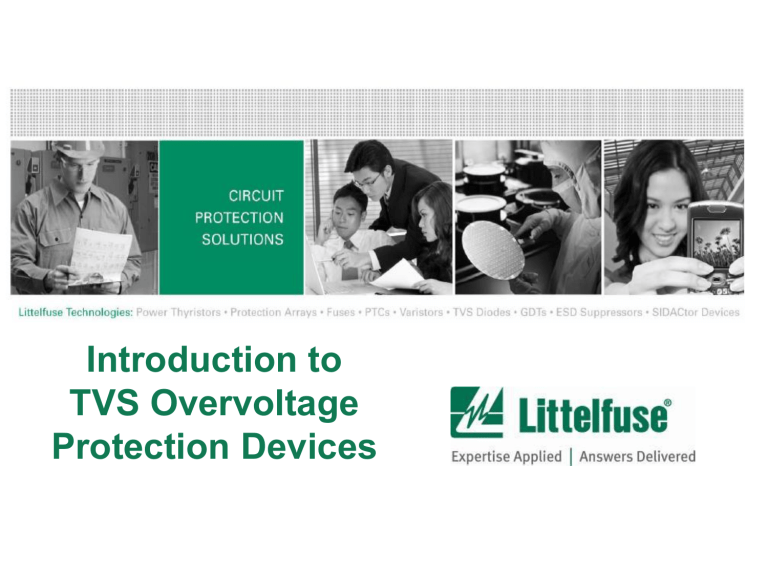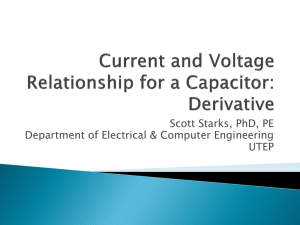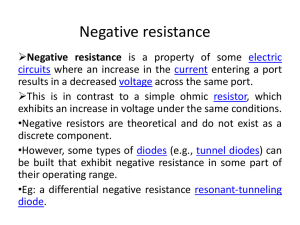Surface Mount TVS Diodes

Introduction to
TVS Overvoltage
Protection Devices
Outline
Overvoltage Protection
– The race is on
– Clamp vs Crowbar
Key Parameters
– Unidirectional vs Bidirectional
– Peak Pulse Power PPPM
– Double Exponential Waveforms
– Reverse Stand-Off Voltage VR
– Breakdown Voltage VBR
– Clampin Voltage VC
– Peak Pulse Current IPP
Product Families
– Part Number Conventions
– Axial Leaded
P4KE, SA, SAC, P6KE
1.5KE, LCE
3KP, 5KP, SLD
15KPA, 20KPA, 30KPA
AK6, AK10
– Surface Mount
SMAJ, P4SMA, SACB
SMBJ, P6SMB, 1KSMB
SMCJ, 1.5SMC
SMDJ, 5.0SMDJ
2
Version01_100407
The Race is On!
Overvoltage Event
Overvoltage
Protector
Protected
Circuit
3
Version01_100407
Clamping Devices vs Crowbar Devices
Transient Event
V line
V line
Clamping Devices
Clamp Voltage
V line
Crowbar Devices
Trigger Voltage
Delatch
4
Version01_100407
Outline
Overvoltage Protection
– The race is on
– Clamp vs Crowbar
Key Parameters
– Unidirectional vs Bidirectional
– Peak Pulse Power PPPM
– Double Exponential
Waveforms
– Reverse Stand-Off Voltage VR
– Breakdown Voltage VBR
– Clamping Voltage VC
– Peak Pulse Current IPP
Product Families
– Part Number Conventions
– Axial Leaded
P4KE, SA, SAC, P6KE
1.5KE, LCE
3KP, 5KP, SLD
15KPA, 20KPA, 30KPA
AK6, AK10
– Surface Mount
SMAJ, P4SMA, SACB
SMBJ, P6SMB, 1KSMB
SMCJ, 1.5SMC
SMDJ, 5.0SMDJ
5
Version01_100407
Key Parameters: Peak Pulse Power
6
Version01_100407
Key Parameters: Peak Pulse Power
Double Exponential Waveforms
– Simulate induced lightning events
– Rise time & decay time in microseconds
10 x 1000
8 x 20
7
Version01_100407
Bidirectional vs Unidirectional
Bidirectional TVS
I I
I I
I I
Unidirectional TVS
I I
I I
I I
Voltage – Current (V-I) Curve
• Voltage is displayed left to right
• Current is displayed up and down
8
Version01_100407
Key Parameters: V
R
+I
I
PP
I
R
I
T
-V
V
R
V
BR
V
C
+V
-I
Reverse Standoff Voltage
9
Version01_100407
Key Parameters: V
BR
+I
I
PP
I
R
I
T
-V
V
R
V
BR
V
C
+V
-I
Breakdown Voltage
10
Version01_100407
Key Parameters: V
C
+I
I
PP
I
R
I
T
-V
V
R
V
BR
V
C
+V
-I
Max Clamping Voltage
11
Version01_100407
Key Parameters: I
pp
+I
Peak Pulse Current
I
PP
I
R
I
T
-V
V
R
V
BR
V
C
+V
-I
12
Version01_100407
13
Version01_100407
Question 1: True or False
A TVS Diode is intended to provide continuous voltage regulation to a circuit.
FALSE
14
Version01_100407
Question 2: True or False
A TVS Diode is a crowbar type of device that brings the protected line close to ground potential.
FALSE
15
Version01_100407
Question 3: True or False
The continuous power rating of a TVS Diode can be found by multiplying the peak allowable pulse current by the clamping voltage.
FALSE
16
Version01_100407
Question 4: True or False
A bidirectional TVS Diode can be used on a DC line.
TRUE
17
Version01_100407
Question 5: True or False
A Unidirectional TVS Diode is symmetrical and has the same clamp voltage regardless of the direction of current flow through the part.
FALSE
18
Version01_100407
Outline
Overvoltage Protection
– The race is on
– Clamp vs Crowbar
Key Parameters
– Unidirectional vs Bidirectional
– Peak Pulse Power PPPM
– Reverse Stand-Off Voltage VR
– Breakdown Voltage VBR
– Clamping Voltage VC
– Peak Pulse Current IPP
Product Families
– Double Exponential Waveforms
– Part Number Conventions
– Axial Leaded
– P4KE, SA, SAC, P6KE
– 1.5KE, LCE
– 3KP, 5KP, SLD
– 15KPA, 20KPA, 30KPA
– AK6, AK10
– Surface Mount
– SMAJ, P4SMA, SACB
– SMBJ, P6SMB, 1KSMB
– SMCJ, 1.5SMC
– SMDJ, 5.0SMDJ
19
Version01_100407
Part Numbering Conventions
• The first portion: Indicates the Peak Pulse Power or the package or both.
• The next portion: Indicates either the V
V
BR
R or the nominal
• Both voltage conventions are industry standards.
• Offering both conventions is a critical driver for sales.
20
Version01_100407
Part Numbering Conventions
V
R
– Based Part Numbers
– Axial Leaded
SA, SAC, LCE
3KP, 5KP, SLD
15KPA, 20KPA, 30KPA
AK6, AK10
– Surface Mount
SMAJ, SACB
SMBJ, SMCJ,
SMDJ, 5.0SMDJ
V
BR
– Based Part Numbers
– Axial Leaded
P4KE, P6KE
1.5KE,
– Surface Mount
P4SMA,
P6SMB, 1KSMB
1.5SMC
21
Version01_100407
Axial Leaded TVS Diodes
DO-41
Available Axial Packages
DO-15 DO-201 P-600
AK-6 AK-10
22
Version01_100407
DO-41 Axial TVS Diodes
P4KE (400W)
23
Version01_100407
DO-15 Axial TVS Diodes
P6KE (600W)
SA (500W)
SAC (500W, Low Cap)
TVS Diode
Isolation
Diode
24
Version01_100407
DO-201 Axial TVS Diodes
1.5KE (1500W)
LCE (1500W, Low Cap)
25
Version01_100407
P-600 Axial TVS Diodes
3KP (3000W)
5KP (5000W)
15KPA (15000W)
20KPA (20000W)
30KPA (30000W)
SLD (2200W - 100x150000 uS Waveform)
26
Version01_100407
AK Series TVS Diodes
AK6 (6000A – 8x20 uS Waveform)
AK10 (10000A – 8x20 uS Waveform)
27
Version01_100407
Surface Mount TVS Diodes
Available Surface Mount Packages
DO-214AC
(SMA J-Bend)
DO-214AA
(SMB J-Bend)
DO-214AB
(SMC J-Bend)
28
Version01_100407
SMA Surface Mount TVS Diodes
SMAJ (400W)
P4SMA (400W)
29
Version01_100407
SMB Surface Mount TVS Diodes
SMBJ (600W)
P6SMB (600W)
SACB (500W, Low Cap)
1KSMB (1000W)
30
Version01_100407
SMC Surface Mount TVS Diodes
SMCJ (1500W)
1.5SMC (1500W)
SMDJ (3000W)
5.0SMDJ (5000W)
31
Version01_100407
Axial TVS Diode Summary
Littelfuse Axial TVS Diodes
Naming
Convention
Polarity DO-41 DO-15 DO-201 P-600
Vbr P4KE P6KE 1.5KE
Vr
Uni / Bi
SA
3KP
5KP
15KPA
20KPA
30KPA
SLD
Low Cap SAC LCE
AK
AK6
AK10
32
Version01_100407
Surface Mount TVS Diode Summary
Littelfuse Surface Mount TVS Diodes
Naming
Convention
Polarity SMA SMB SMC
Vbr P4SMA
P6SMB
1KSMB
1.5SMC
Uni / Bi
Vr
SMAJ SMBJ
SMCJ
SMDJ
5.0SMDJ
Low Cap SACB
33
Version01_100407
34
Version01_100407
Question 1: True or False
The leakage current of a TVS Diode is measured at its breakdown voltage.
FALSE
35
Version01_100407
Question 2: True or False
If the same pulse current is allowed to flow through both a low power and a high power
TVS Diode, the clamping voltage will be lower on the high power device.
TRUE
36
Version01_100407
Question 3: True or False
If a narrow 20µS current pulse is allowed to flow through a TVS Diode, the allowable power level can be higher than the 10x1000µS power level indicated on the data sheet.
TRUE
37
Version01_100407
Question 4: True or False
The AK series of TVS Diodes can handle a million watts of power during a transient event.
TRUE
38
Version01_100407
Question 5: True or False
TVS Diode part numbers always refer to the actual breakdown voltage of the device.
FALSE
39
Version01_100407
Introduction to TVS
Overvoltage Protection Devices
Thank You!
40
Version01_100407








